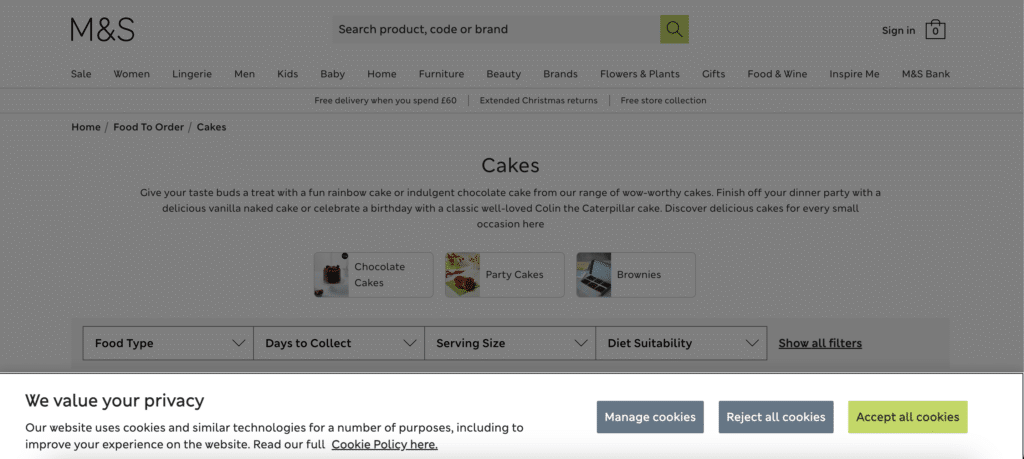Many countries have implemented several data protection laws to ensure their citizens’ digital privacy. This article is a complete guide for businesses about cookie laws, helping them understand and follow the rules to protect user information.
Cookies are small text files containing various information, such as user activity, site preferences, session data, etc. They are used to collect information from site visitors and provide a personalized browsing experience for them.
Since cookies carry a lot of information about site visitors, they may risk users’ privacy. Many data protection laws apply to using cookies and collecting personal information using cookies.
Dive into this guide to learn more about cookie laws and how to comply with them.
What Are Cookie Laws?
Cookie laws are legislations that are aimed at protecting the personal information of website visitors when they navigate through the internet. Cookie laws regulate the use of cookies by websites to track user’s activity on the internet.
As more and more users are navigating through the internet, a bulk amount of information is being shared every day. This information can be used for targeted marketing, providing personalized content or even sold to third parties.
However, we can’t just avoid the use of cookies, as they are necessary to improve the user experience on the website. So, it’s crucial to find a balance between user privacy and a good website experience.
Cookie laws play a key role in achieving this balance by setting rules for businesses on how to collect, store, and use cookie data while safeguarding the privacy of users. These laws may require businesses to get consent, either explicitly or implicitly, from visitors before collecting their information using cookies.
Typically, this is done through a cookie banner on the website, informing visitors about cookie usage and asking for their consent.

Now, let’s explore further about the importance of cookie laws.
Why Do We Need Cookie Laws?
Cookie laws are designed to safeguard user privacy, ensure transparent data practices, and foster a secure and trustworthy online environment for individuals and businesses alike.
Here are some reasons why cookie laws are important:
Protect the privacy of users: Cookies can store sensitive information about users, including their browsing history, personal preferences, etc. Cookie laws aim to help protect user privacy by regulating how websites collect, store, and use this data.
Give control to users over their data: Cookie laws give users more control over their personal information shared with the website. Websites require to obtain consent from the visitors before loading cookies on their browsers. This ensures that users are aware of the data collection and promotes transparency.
Setting standards: Cookie laws set standards for enhancing the data security for how websites handle users’ information. It establishes a framework for websites to follow to manage cookie data and protect users’ privacy.
Compliance with privacy regulations: Cookie laws help businesses comply with privacy regulations such as GDPR and CCPA, avoiding potential legal consequences and fines for websites.
Create a balance between user experience and privacy: While protecting privacy, cookie laws also aim to create a balance that allows websites to provide a personalized and improved user experience.
What Are the Major Cookie Laws in the World?
Many major countries in the world have implemented cookie laws or data protection regulations that regulate the use of cookies on websites.
Here are some of the major cookie laws in the world:
EU Cookie Law & GDPR
EU Cookie law, also known as the ePrivacy Directive, was first introduced in 2002 as a legislative measure to protect privacy in the digital world. Later, in 2018, the EU introduced the General Data Protection Regulation, a holistic and advanced data protection law in the EU region. The GDPR is considered to be one of the most significant data protection laws in the world.
Read More: Five Years of GDPR: A Look Back at the Impact of the EU’s Data Protection Law
US Cookie Laws
In the United States, there isn’t any federal data protection law as of now. However, many states have introduced state-wide data protection laws.
CPRA – California
The California Privacy Rights Act is the updated version of the California Consumer Protection Act and was enacted on January 01, 2023. As per CPRA, businesses are required to provide transparency about the data they collect from consumers. CPRA adds several new rights to consumers in California, along with the existing rights under CCPA.
Read more: California Privacy Rights Act (CPRA) – A Comprehensive Guide for Businesses
VCDPA – Virginia
The Virginia Consumer Data Protection Act, effective as of January 01, 2023, grants several rights to residents of Virginia concerning the handling of their personal information by businesses. Similar to the CCPA, this law focuses on safeguarding digital data rather than cookies specifically.
CPA – Colorado
The Colorado Privacy Act came into effect on July 01, 2023. The law is applicable to any business that operates in Colorado or deals business with the residents of Colorado and handles personal data from 100,000 or more customers annually or benefits financially from the sale of personal information of 25,000 consumers.
Although the Colorado Privacy Act (CPA) doesn’t explicitly refer to cookies, it implies the inclusion of cookie data within the broader category of personal data used for advertising and consumer profiling.
UCPA – Utah
The Utah’s Consumer Privacy Act came into effect on December 31, 2023. The law provides people residing in Utah state several rights over their personal information shared with businesses. Unlike CPRA or CCPA, UCPA takes a lighter approach for businesses.
CDPA – Connecticut
The Connecticut Data Privacy Act came into effect on July 01, 2023. It grants several rights to Connecticut residents over their personal data and establishes a framework for ensuring responsible data-handling practices for businesses.
FDPA of France
The French Data Protection Act is one of the oldest data protection regulations in the world. The law was passed in 1978 and was aimed to protect individuals’ right to privacy with respect to the processing of personal data.
After the introduction of the EU’s GDPR, the French Data Protection Authority introduced the Commission Nationale de l’informatique et des libertés (CNIL) as an agency to regulate the privacy laws in the country.
Read more: What is CNIL and How to Comply with It?
LGPD of Brazil
The Lei Geral de Proteção de Dados is the data protection regulation of Brazil, which came into effect in September 2020. This law is designed to safeguard the personal data of Brazilian citizens, granting them various rights to ensure freedom, intimacy, and privacy.
How to Comply With Cookie Laws?
Complying with all cookie laws may seem daunting to you, but in fact, most cookie laws are somewhat similar to each other. Here are some steps you can take to ensure cookie compliance for your website.

Step 01: Understand the Regulations
First, understand the applicable law for your business. If you operate in the EU, follow the GDPR guidelines; for handling consumer data in California, follow the CPRA or CCPA guidelines. Identify the applicable laws for your business and understand their regulations.
At this point, seeking advice from a legal professional is ideal to stay informed about any updates to existing laws.
Step 02: Create a Cookie Policy
A cookie policy is a legal document that explains to your users about cookies used on your website. It helps you inform your site visitors about the use of cookies on your website. Not all Cookie laws make it mandatory for websites to create a cookie policy, but it is ideal that you have a well-defined cookie policy on your website.
You may also add the relevant information about the use of cookies on your privacy policy page.
For more information, refer to our guide: Requirements for a GDPR Compliant Cookie Policy
Step 03: Create a Cookie Banner
A cookie consent banner is a notice that discloses the use of cookies on the website and has buttons or links to obtain consent from the website visitors for using cookies. Cookie banners help you comply with cookie laws, as you can provide users with the option to accept or reject cookies.
Also read: How to Create a GDPR Compliant Cookie Banner in WordPress?
Step 04: Obtain Explicit Consent From Site Visitors
Some cookie laws may only require implicit consent, whereas some require explicit consent. It is always better to ask for explicit consent before loading cookies on your visitors’ browsers. You may block third-party scripts until the user provides consent.
Also read: Cookie Consent: The Ultimate Guide
Step 05: Allow Users to Manage Consent
Every cookie law provides users with various rights regarding their personal information shared with businesses. These rights include the right to edit, update, or delete information at any time upon request.
Users should have the option to withdraw their consent at any time. It is ideal to ask for consent again after six months or one year or as required by the applicable law. You may also provide a copy of the data collected from them upon request.
Step 06: Avoid Dark Patterns in Cookie Banners
This is really important! Some websites try to create ambiguity in cookie banners in order to trap users into giving out consent. You should be aware that most cookie laws clearly specify that consent should be given freely and with clear affirmative action. So, any dark patterns, such as pre-ticked boxes or hiding the reject buttons, are unfair and illegal.
Refer to our guide on Best UI/UX Practices for Cookie Consent Banners
Step 07: Review and Update Consent Practices Regularly
You should regularly review your cookie consent practices and be up to date on any applicable laws. The digital privacy landscape is ever-evolving, and more and more countries are yet to introduce their own data protection laws. If you have a privacy-focused approach for your business, you will be able to comply with any upcoming privacy laws easily.
For more information, refer to this article: Privacy by Design (PbD): A Holistic Approach to Safeguarding Data Privacy
These are some important steps to ensure cookie compliance for your website. If you want a simple solution to manage cookie compliance, you can use any consent management platform like our GDPR Cookie Consent Plugin.
GDPR Cookie Consent Plugin is a native consent management platform for WordPress websites. It lets you create a cookie consent banner, obtain prior consent from your site visitors, and help you comply with major cookie laws, such as GDPR and CCPA.
Conclusion
Cookie laws establish a framework for websites to use cookies and protect the privacy rights of website visitors. Since there are many cookie laws in the world, it may seem difficult to comply with all these regulations. So it’s better you identify the laws that are applicable to your business and follow the specific regulations.
You may also use any consent management platform to manage cookie compliance for your business.
We hope that this article has helped you understand what cookie laws are and how to comply with them. If you have any questions, drop them in the comments section; we’d be happy to help you.
Disclaimer: This article was intended for informational purposes only and does not represent legal advice. We have no intention of obtaining any kind of attorney-client relationship. If you are looking for legal advice, we recommend you contact a professional.



